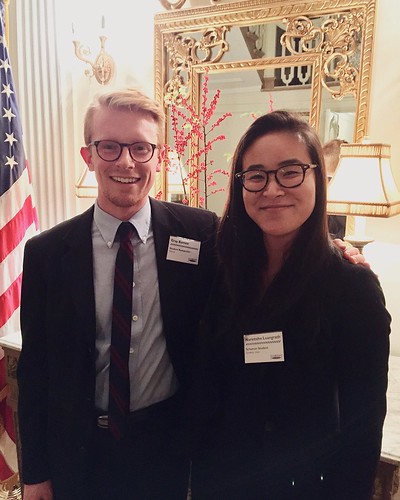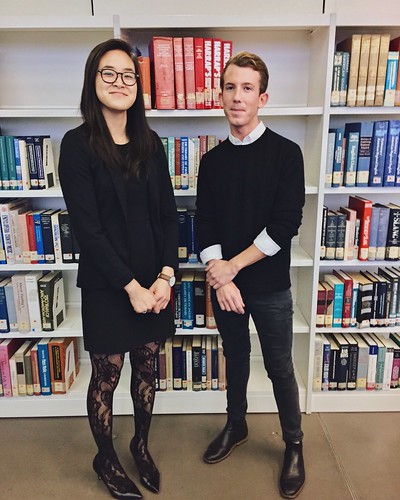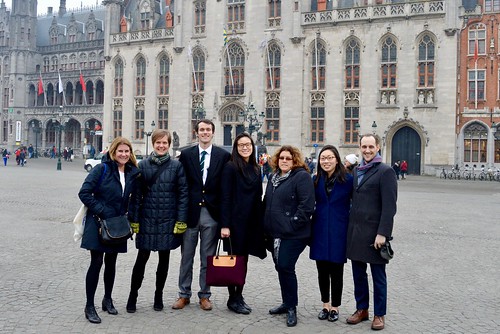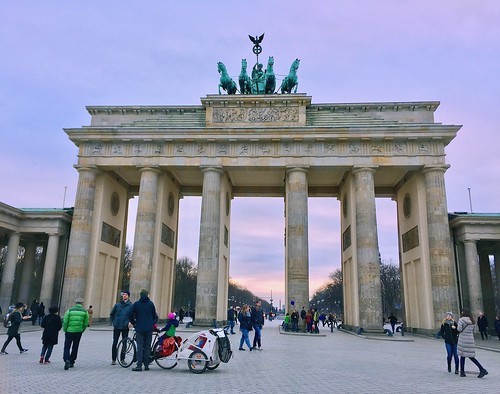My Fulbright-Schuman research project examines the labor market integration of refugees in select EU Member States. Broadly, my study looks at how private enterprise works with government agencies in facilitating refugees’ job readiness and labor market integration, whether through the direct hiring of refugees or through policy development (e.g., through influencing the development of vocational training programs, apprenticeships, industry-specific language courses, etc.). In particular, I am interested in the role of small- and medium-sized enterprises (SMEs) in these endeavors. I completed interviews in my case countries – Germany and Sweden – during the winter and spring. I have primarily interviewed federal and local government officials, public employment service staff, representatives from private industry, academic and think tank researchers, and non-profit/direct service personnel.
Although my research interests mainly surround refugees’ economic integration in so-called “final destination” countries like Germany and Sweden, some of my interviewees’ answers got me thinking about the migration journey itself, including how experiences in transit countries or in countries of first-arrival might impact long-term integration (economic or otherwise) in countries of final destination. While conducting interviews in my case countries earlier this year, I did not always get much of an in-depth discussion or consideration of the challenges associated with long migration journeys – whether they were psychological (i.e., trauma), physical (i.e., injuries that make working difficult or impossible), or monetary (i.e., urgency to pay off smuggling fees upon arrival in destination countries) – and how those challenges, experienced in varying degrees, impact short- and long-term integration and individual decision-making. These knowledge gaps were not necessarily the fault of my interviewees; after all, they were focused on getting refugees into language and vocational training
Insofar as a migration narrative ever “ends,” my interviewees in Germany and Sweden were meeting refugees at the physical conclusion of their journeys. But reflecting on my interview findings made me understand the importance of a trauma-informed, anti-racist approach to social service delivery – in healthcare, employment assistance, and beyond. Thus, to supplement my case studies, I have decided to spend the last few weeks of my Fulbright year talking to refugee assistance organizations in countries of transit or first-arrival. Participating in the Fulbright program taught me the importance of being open to new experiences and people, and this includes being flexible with amending my initial research and travel plans.
My Fulbright project, but also the early direction of my career, has been focused on better understanding how to build “welcoming communities” for refugees and other new arrivals. Labor market inclusion can be a helpful conduit through which we can understand broader integration, but what combination of factors and support structures allow refugees to feel like they have a stake in society, that they are upwardly mobile, etc.? After all, feeling “integrated” or welcomed in a host society means much more than just having a job. My early work as a public servant has focused on efforts by government agencies, civil society, and other relevant stakeholders to better facilitate refugee and immigrant inclusion in the United States.
Thanks to the Fulbright-Schuman program, I have been able to continue dedicating myself to this work; now, as a researcher learning about these issues in a European context.
As the last month of my grant period begins, this blog post also serves as a brief reflection on my Fulbright experience. I did not study abroad as an undergraduate, so I am grateful for the financial and institutional support provided by the Fulbright-Schuman program as I travel throughout the EU (visiting many countries for the first time!) and engage with migration experts. It is a challenging, but fascinating time to be researching the economic integration of refugees in Europe; as Member States move from emergency response and ad-hoc policy development to constructing long-term strategies for integrating new arrivals, I feel privileged to have gained some insight into this process as a Fulbright grantee.
In addition to improving my research skills and making new professional contacts, I also developed friendships with grantees living throughout EU while participating in the Fulbright Belgium/Luxembourg Commission’s EU-NATO Seminar and EU-US Young Leaders Seminar. I am grateful for the ways in which these new friendships inform and challenge my thinking about issues beyond migration, and I hope to continue these conversations after I return to the U.S.
Narintohn Luangrath is a 2016-2017 Fulbright Schuman Student Researcher and a recent graduate of Boston College. She spent the past year in Belgium conducting research on “Beyond Humanitarian Protection: The Labor Integration of Refugees in the European Union.” Articles are written by Fulbright grantees and do not reflect the opinions of the Fulbright Commission, the grantees’ host institutions, or the U.S. Department of State.









